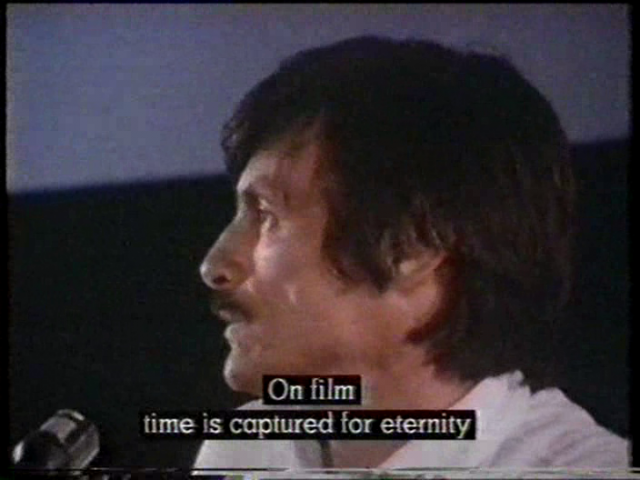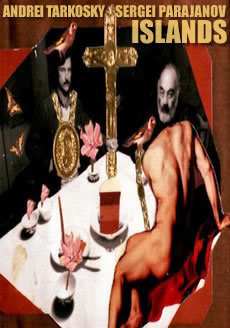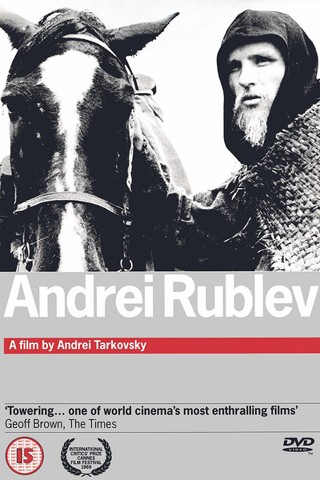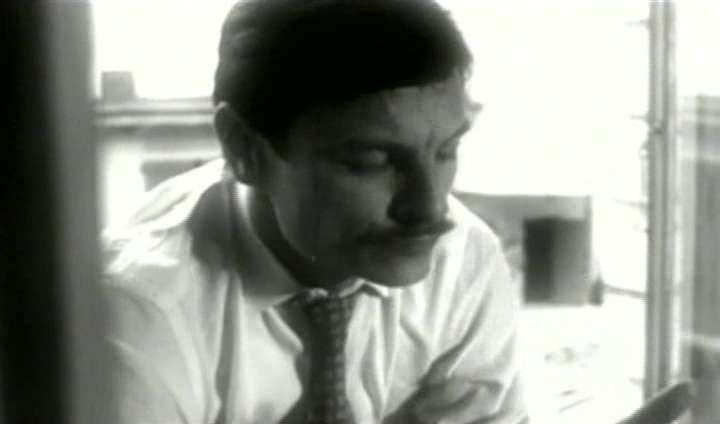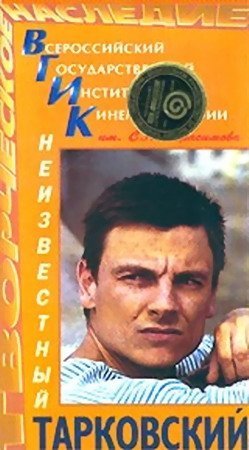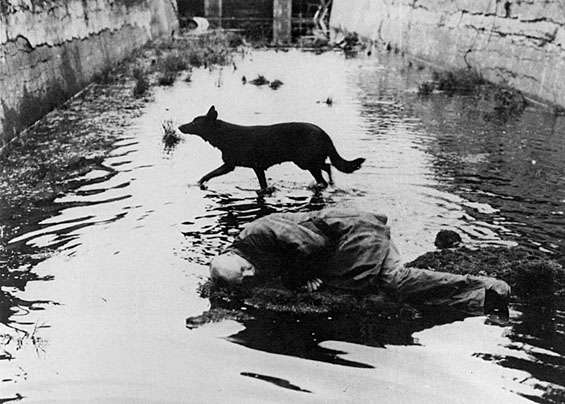Broadcast on BBC2 Arena, 13 March 1987. Contains interview footage with Tarkovsky as he discusses each of his seven major films. He also talks about his world-view and
his philosophy of filmmaking. The film also includes footage of a Tarkovsky lecture to
young film students in which he expresses his thoughts on modern cinema. Read More »
Andrei Tarkovsky
-
Donatella Baglivo – Tarkovsky’s Cinema + Interviews (1987)
1981-1990Andrei TarkovskyDocumentaryDonatella Baglivo -
Levon Grigoryan – Andrei Tarkovsky & Sergei Parajanov – Islands (1988)
1981-1990Andrei TarkovskyDocumentaryLevon GrigoryanSergei ParajanovUSSR
Description: A 40 minute documentary discussing the friendship of Tarkovsky and Parajanov and their contrasting filmmaking styles and personalities, including interviews with friends and associates.Read More »
-
Andrei Tarkovsky – Andrey Rublyov (1966)
1961-1970Amos Vogel: Film as a Subversive ArtAndrei TarkovskyArthouseEpicUSSRQuote:
Widely recognized as a masterpiece, Andrei Tarkovsky’s 205-minute medieval epic, based on the life of the Russian monk and icon painter, was not seen as the director intended it until its re-release over twenty years after its completion. The film was not screened publicly in its own country (and then only in an abridged form) until 1972, three years after winning the International Critics Prize at the Cannes Film Festival. Calling the film frightening, obscure, and unhistorical, Soviet authorities edited the picture on several occasions, removing as much as an entire hour from the original.Presented as a tableaux of seven sections in black and white, with a final montage of Rublev’s painted icons in color, the film takes an unflinching gaze at medieval Russia during the first quarter of the 15th century, a period of Mongol-Tartar invasion and growing Christian influence. Commissioned to paint the interior of the Vladimir cathedral, Andrei Rublev (Anatoli Solonitsyn) leaves the Andronnikov monastery with an entourage of monks and assistants, witnessing in his travels the degradations befalling his fellow Russians, including pillage, oppression from tyrants and Mongols, torture, rape, and plague. Faced with the brutalities of the world outside the religious enclave, Rublev’s faith is shaken, prompting him to question the uses or even possibility of art in a degraded world. After Mongols sack the city of Vladimir, burning the very cathedral that he has been commissioned to paint, Rublev takes a vow of silence and withdraws completely, removing himself to the hermetic confines of the monastery.
Read More » -
Denis Trofimov – Sacrifices of Andrei Tarkovsky (2012)
2011-2020Andrei TarkovskyDenis TrofimovDocumentaryRussiaDedicated to the 80th anniversary of the director. The film uses unique materials related to the years Tarkovsky spent in Italy: Florence, where he lived, and where his museum now exists, at a place called Banja Vignoni, where “Nostalgia” was filmed in the house of the Italian screenwriter Tonino Guerra.
The film will include rare unique images: young Tarkovsky on the set, fragments of the documentary “Time of travel”, which was filmed in Italy by Andrei Tarkovsky with Tonino Guerra. For the first time viewers will see the location of filming of “Stalker” in Estonia…Read More »
-
Dmitry Trakovsky – Meeting Andrei Tarkovsky (2008)
2001-2010Andrei TarkovskyDmitry TrakovskyDocumentaryUSA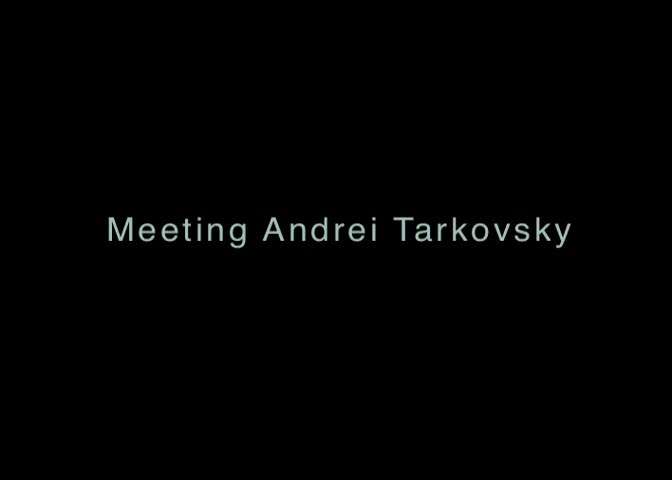
“This film was conceived in honor of the 20th anniversary of the death of one of the greatest directors in the history of cinema – Andrei Tarkovsky. The young filmmaker Dmitry Trakovsky sets out in search of his favorite director’s legacy. His journey leads him to fifteen moving interviews in California, Italy, Sweden, and finally, Russia, as he attempts to come closer to the meaning of one of Tarkovsky’s most enigmatic beliefs… that death doesn’t exist. The result is the acclaimed documentary MEETING ANDREI TARKOVSKY, which takes an in-depth and poetic look at the late Russian filmmaker who created under the oppressive censorship of the Soviet government. It explores the life and films of Tarkovsky through diverse interviews and stories told by friends, colleagues and others who have been influenced by his art, providing a rare glimpse into Tarkovsky’s working methods and personal philosophy of humanity.”Read More »
-
Andrei Tarkovsky – Zerkalo AKA The Mirror [+Extras] (1975)
1971-1980Andrei TarkovskyArthouseDramaUSSRSYNOPSIS
With Zerkalo (The Mirror), legendary Russian filmmaker Andrei Tarkovsky crafts perhaps his most profound and compelling film. What started off for Tarkovsky as a planned series of interviews with his own mother evolved into a lyrical and complex circular meditation on love, loyalty, memory, and history. Time shifts and generations merge as a single extraordinary actress (Margarita Terekhova) plays the narrator’s former wife as well as his mother. Tarkovsky’s memories as well as those of his mother are intermingled as a dark, sumptuous, and dreamlike pre-World War II Russia is evoked, accompanied throughout by the voice of Tarkovsky’s father reading his own elegiac poetry. The spectacle of nature and its ubiquitous and ever-shifting presence is captured by Tarkovsky’s camera as if by magic–the family cabin nestled deep in the verdant woods, a barn on fire in the middle of a gentle rainstorm, a gigantic wind enveloping a man as he walks through a wheat field–all creating indelible images with deep if mysterious emotional resonance. As the timeline shifts between the narrator’s generation and his mother’s, newsreel footage of Russian wars, triumphs, and disasters are juxtaposed with imagined scenes from the past, present, and future, crafting a silently lucid cinematic panopticon of memory, history, and nature. (Rotten Tomatoes)Read More » -
Andrei Tarkovsky – Ubiytsy (Убийцы) AKA The Killers (1958)
1951-1960Andrei TarkovskyShort FilmUSSRErnest Hemingway’ wrote a short story called “The Killers”. It has penetrated the interest of readers and filmmakers since it was initially brought to the public. First in film in 1946, by director Robert Siodmak with his adaptation of ‘The Killers’. It was the epitome of the term ‘film noir’. In 1956, then-film student Andrei Tarkovsky brought the world his version in a 19-minute short and then in 1964, Don Siegel (originally on tap to direct the 1946 version) took the reigns for yet another version.Read More »
-
Andrei Tarkovsky – Segodnya uvolneniya ne budet (Сегодня увольнения не будет) AKA There Will Be No Leave Today (1958)
Drama1951-1960Andrei TarkovskyThrillerUSSRFrom wikipedia
There Will be No Leave Today (Russian: Сегодня увольнения не будет, Sevodnya uvolnyeniya nye budyet) is a 1959 student film by the Russian film director Andrei Tarkovsky and his fellow student Aleksandr Gordon. The film is about members of the Soviet army during a time of peace. It was Tarkovsky’s second film, produced while being a student at the State Institute of Cinematography.Read More »
-
Eduard Artemiev – Tarkovsky movies OST (1972-79)
1971-1980Andrei TarkovskySoundtrackEduard Artemiev – Tarkovsky movies OST (Solaris-The Mirror- Stalker)
Eduard Artemiev
In the latter part of the 1950’s, the engineer and mathematician Yevgeniy Murzin had a problem. He had just realized his life long dream of constructing music synthesizer (then called “ANS”) but knew no musician with sufficient imagination to explore its vast potential. In 1960, upon meeting 22-year-old Edward Artemyev, a recent graduate of the Moscow conservatoire, Murzin immediately felt he had found what he was searching for in the young composer, who embraced the new instrument and quickly mastered its many subtleties. Artemyev has since composed numerous works varying from electronic avant-garde to film music. He is probably best known for his collaboration with A. Tarkovskiy composing music for his films: “SOLARIS” in 1972, “THE MIRROR” in 1975 and “STALKER” in 1979; and with such filmmakers as Andrei Mikhalkov-Kontchalovskiy and Nikita Mikhalkov.Read More »
